
REBECCA LUKER
The most moving moment in the new Off-Broadway musical Death Takes a Holiday, which features a score by Tony winner Maury Yeston — composer of Nine and the glorious Titanic — occurs in the second act when three-time Tony nominee Rebecca Luker wraps her rich, full-bodied tones around the lovely ballad "Losing Roberto," an ode to her late son that the actress delivers simply and with heartfelt emotion to Death (now played by Kevin Earley, who recently replaced British star Julian Ovenden). Luker, who portrays matriarch Duchess Lamberti, is one of the great sopranos to emerge in the musical theatre in the last two decades, and she has also become an equally compelling actress. She is joined in the new Yeston-Thomas Meehan musical at the intimate Laura Pels Theatre by Earley as well as Linda Balgord (Contessa Danielli), Matt Cavenaugh (Eric Fenton), Mara Davi (Alice), Simon Jones (Dr. Dario Albione), Jill Paice (Grazia), Michael Siberry (as patriarch Duke Lamberti), Alexandra Socha (Daisy Fenton) and Max von Essen (Corrado Montelli). Last week I had the pleasure of chatting with the singing actress, who is married to Tony-nominated actor Danny Burstein, who returns to Broadway this month in the Kennedy Center's acclaimed production of Stephen Sondheim's Follies. Luker, whose Broadway credits boast The Phantom of the Opera, The Secret Garden, Show Boat, The Sound of Music, Nine and, most recently, Mary Poppins, spoke about her newest stage role, her thoughts about leaving the Disney hit Poppins and her actor-husband; that interview follows.
Question: How did this role come about for you?
Rebecca Luker: Well, I was very fortunate to have been asked to do it. Every now and then, something like that happens [laughs] when you don't have to audition for something, so I relish those. And, I immediately said yes when I found out it was a show that Maury had written, and also with direction by Doug Hughes. I was immediately interested, and then they told me who wanted to be in the cast, so I didn't have to think about it too long. I'm really glad I took the job.
| |
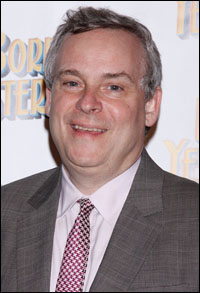 |
|
| Director Doug Hughes | ||
| photo by Joseph Marzullo/WENN |
Luker: No, in fact this was his maiden voyage into musical land! [Laughs.] He is just a delightful person. I doubt you've spoken to anybody who's said anything but that. He is a wonderful person. The very first day of rehearsal he gave a speech, as a director often does, and I was floored by his intelligence, his sense of humor, his heart. He's got it all. He's very smart, and he's one of those directors who lets the actors—who lets everyone in the room, really, right down to the understudies—put in their two-cents' worth. He takes everyone's opinion into account. He's so secure in his own personhood and director abilities. He's so giving. Very impressive to me—it's very rare that you find that in a director, and we had a wonderful time working with him. I don't know what he would say about his experience, but we all love him very much, and I hope to do something else with him one day.
Question: Since he's only directed plays before, did he approach the scenes in a different way than maybe someone who mostly directs musicals? Did you find any difference there?
Luker: That's a very difficult question. I don't know that he did approach anything a different way. I think that any good director, whether directing a musical or a play, should approach the scenes from the standpoint of them being a play, and I think Doug did that. He might have been a little thrown by all of the musical stuff being thrown at him, you know? Maury is very opinionated—in a good way—and I'm not sure if Doug was quite prepared for all of the demands that a musical throws at you, but I think he caught up to speed very quickly. I think he very much did approach the scenes as the director of a play would, which is, I think, the right thing to do in every musical situation.
| |
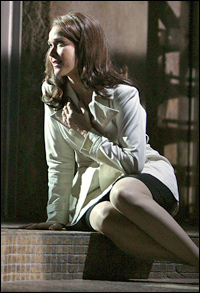 |
|
| Luker in Nine. | ||
| photo by Paul Kolnik |
Luker: I do, too! I just think Maury has written, yet again, another gorgeous, glorious score in the tradition of big, grand, romantic fashion. I think romantic is the operative word for him. I think he is one of the most wonderful melodists we have. I love singing his music. When you work with Maury, he is always more than willing to change the key, change the phrasing, change the lyrics—whatever makes the show better and whatever makes you more comfortable as a singer. It's just a pleasure to sing his music. I have this wonderful ballad in Act Two in this show that is very stripped of any frills. It's a very honest moment in the show where I get to talk about my dead son, and it's just a beautiful song. Question: I thought that was one of the most beautiful songs in the show.
Luker: Oh, thank you. It's a good one, yeah.
Question: I just wonder how you went about approaching the song…
Luker: Working with Tom Meehan—I adored him too—Tom and Doug and Maury, we tried, and I think got there, made this song come right out of the scene. I wanted it to be just an honest moment, and not too singy, not too high, and I liked the fact that it's not a long song. She sort of just says what she wants to say about her son, and there it is, and that's it. We rewrote the scene preceding it when we got to the theatre because it didn't seem to be working. Between Julian Ovenden, myself, Doug, everyone involved thought it needed to be reworked, so we all threw our ideas into the pot, and I think Tom Meehan wrote something, I think, very good, and we went from there. It's a pleasure to do a show that's new that you can do that with.
| |
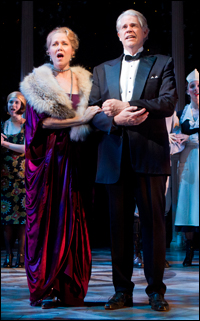 |
|
| Luker and Michael Siberry in Death Takes a Holiday. | ||
| photo by Joan Marcus |
Luker: I see her as the mostly calm voice of reason in the show, the matriarch that's sort of presiding over the family, trying to make sure the family is happy. She has an interesting journey in the show where she—I don't know what's going on with my husband, he's acting very strangely, and my daughter's life is falling apart—so I think in Act Two, before the song, she rallies her strength and is able to tell this character of Death what she thinks of him, and she just lets it all hang out about her son. I just see her as the strong matriarch character who needs to be at the center of every family.
Question: This may be a little bit maudlin, but does working on a show about death make you think about your own mortality? Has the cast discussed that or how has that been treated throughout?
Luker: Oh, yeah, absolutely. In fact, from day one, that speech that I told you about that Doug gave to the company was all about that—about life, and how this play is really just about appreciating every single little moment that we live because it can all be over in the next instant, and how profound our life is here on Earth. That's sort of what it's about, you know, loving those around you, telling them how much you love them, so, yes, it certainly does make me think about that, about my own life and appreciate it all the more.
Question: I know there was a bit of drama on opening night with Julian out sick…
Luker: Yeah, that was a disappointment that Julian couldn't join us. That happens on occasion, not very often. I don't think I've ever missed an opening night; I hope I don't ever have to, but I so felt for him. As singers, you just never know when something is going to hit your voice… But our understudy, Kevin Earley, of course, saved the day. He virtually learned the show on his own with really, maybe, no rehearsal. Maybe one understudy rehearsal—I believe that's right. And, that's extraordinary. It's a very big role. He literally just stepped up to the plate and hit it out of the park. [He has] a beautiful voice, he's a great guy, so truly, truly—we are grateful to have him.
Question: What's it like playing that theatre, which is such a nice, intimate space?
Luker: It's very unusual for me. I'm usually used to twice the size, or three times the size, of that theatre, and it's just a sweet little 400-seat [space], the Laura Pels. Derek McLane's set I think fits so sweetly into that space, maybe even making it look bigger and grander, I hope. This show can be, of course, put on a big stage with a big orchestra, and I hope that that happens for this one day, although Maury did mean it to be a small chamber piece. That's what he wanted it to be and that's where it is, and I think it does work well that way also. But, I love working in that theatre. You feel like you have to work less, maybe, when the theatre is small like that, you can be real and be small.
| |
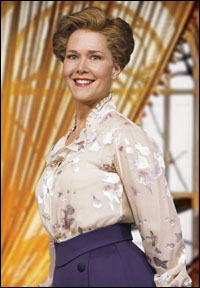 |
|
| Luker in Mary Poppins. | ||
| photo by Andrew Eccles |
Luker: It's hard to leave a job that's steady like that, but for me, once you've done a show for three years, even if I don't have a job coming up, I tend to leave, just because you are worried about getting stale, and you just want to move on to something else. And, somehow leaving a show frees you up to do that, and so, for me, it was not difficult. I felt that I stayed enough time. It was a wonderful job and a very great time. I made life-long friends. I'll never forget it. But, I was happy to move on from it. Question: Your husband is also coming back to Broadway.
Luker: Yes! Yay! That's nice, even though it's only a limited run. He's happy that it will get its four months on Broadway.
Question: Did you get a chance to see it out in D.C.?
Luker: I did. I saw it in D.C. and loved it. I've never seen a production of Follies before… I knew the score, I knew the book and all that, but I'd never seen it on stage, and it's just a haunting, beautiful piece, and I've heard and seen snippets of other Buddys, and I think Danny is just terrific even though I am married to him. [Laughs.] I'm very proud of him, and I think that his Buddy is kind of wonderful.
Question: I do, too. I thought he was terrific.
Luker: Oh, you do? Good! Thank you so much. I think he sort of approaches every role like that. He gets his teeth into it and says, "I'm going to do something with this role," and I'm sort of in awe of him, I really am. I'm very proud of him.
Question: How did you two meet?
Luker: We met doing Time and Again at the Old Globe—the world premiere of that way back in '96 that Jack O'Brien directed. We were just buddies for about a year-and-a-half before we started dating. Who knew that he'd turn out to be the one? The one to grow old with. We were married in 2000, so we've been married 11 years now, and two teenage stepsons—that's a whole new life. It's been great, and he's a great guy.
Question: Do you find being married to someone who's also in the business helpful?
Luker: [Laughs.] I do. For me, that's all I've ever known. I've maybe dated one person in my life who wasn't involved in the arts in some way. [Laughs.] Certainly with Danny and myself, we are a great team. He's my coach, he's my best friend, he's my touchstone in all things, and I hope I am for him. But, yeah, I can't even imagine being married to someone who is not in show business, somehow.
| |
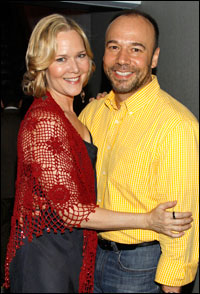 |
|
| Luker and Danny Burstein | ||
| photo by Joseph Marzullo/WENN |
Luker: [Laughs.] Well, that would be great. We don't tend to get the same types of shows, I don't know if you've noticed. [Laughs.] I mean, South Pacific I would've done had I been maybe a little younger, but other than that, I don't tend to get the crazy shows he gets—Women on the Verge… and Drowsy Chaperone—although I'd love to do a show like that. So, yeah, I'd love to work with Danny again, particularly, I'd love to do a play with him—he's such a great actor, I'd love to just act with him. That would be lovely, so hopefully one day.
Question: Do you have any projects in the works? Any recordings or concerts?
Luker: The only thing I know about is Oct. 12-15 I'm going to do this big thing at the Kennedy Center called Some Enchanted Evening. It's produced by Wolf Trap, but in the fall the Wolf Trap does their concerts at the Kennedy Center. I'm guessing in the Eisenhower, the big theatre… It's just me and Aaron Lazar and Rod Gilfry, and we're just going to sing a lot of Rodgers and Hammerstein for three nights. And, other than that, I'm going to be, hopefully in 2012, in this new movie release coming out that I'm in that David Chase produced and directed. David Chase of "The Sopranos." It hasn't yet been titled. It's a 1963 period piece in New Jersey, and I play an upper-middle class mom of a drugged-out teenager. So, I'm looking forward to that. It will be my feature-film debut.
Question: Congratulations.
Luker: Thank you! It's weird that I did that, but it's very, very fun, and I'd love to do more film and TV. It's very different from theatre. I would love to do a smattering of all of it, all the time, but it's hard to vary it like that.
Question: How does the concert and cabaret work differ for you from being in a theatre piece?
Luker: Oh, gosh—cabarets are so different. I've been at Feinstein's a couple of times and the Allen Room a couple of times now. Particularly, in Feinstein's when you are in that small cabaret space, it's a lot of fun, but [laughs] when I first did it, people are right in your lap. I think that everybody needs to have a script because it keeps you on point and makes the show move along, but you quickly find [that] you have to get off script… It's impossible to stand up there and be stodgy and stay on your script, so it taught me to improvise better and have a fun rapport with the audience, and I really enjoyed it. It's very hard work though—doing one of those stints at Feinstein's and we do like two weeks—it's killer. Killer, killer, killer, hard work, and not a lot of money, actually, unless you're totally sold out every night. So, those are hard. You really have to do those out of love. [Laughs.] If you have a program you really want to do or try it out or something, that's why you do those things, but I love it. I love the concert world. I love singing in front of a big symphony. It's one of my favorite things in the world to do, and recording is another favorite thing of mine.
Question: I remember at one point you thought you may do an opera. Is that still something of interest?
Luker: Oh, yes! Well, throughout my career, I do classical work now and again. Every now and then I'll sing something with a symphony—like a Bernstein piece or something—it's off the radar, but I do do that sort of thing. I sang Samuel Barber's "Knoxville" a few summers ago down in Melbourne, FL. I would love to do more of that, and I think I will continue to do more of that kind of work if I keep my voice in shape. But I would love to do an opera—a whole opera—absolutely!
[Tickets ($76-$86) are on sale at Roundabout Ticket Services at (212)719-1300, online at www.roundabouttheatre.org or at the Laura Pels Theatre at the Harold and Miriam Steinberg Center for Theatre box office (111 West 46 Street).]
Well, that's all for now. Happy diva-watching! E-mail questions or comments to [email protected].
View highlights from the show:










